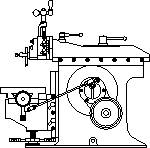

Howard is also directly responsible for my interest in shapers since my first (and favorite) shaper was the result of trading a 7-inch lathe for his 9-inch shaper. So take it away Howard.
I visited dozens of small (10' x 20') independent machine shops and almost always found a shaper as part of the basic equipment. All were fairly recently (within the past 5 to 15 years) manufactured and all were from mainland China. Almost all of these shops were primitive, compared to what we have here in the USA, but the work they turn out is first class. There is a tremendous amount of ingenious patchwork done on both small and large engines – e.g. they will literally make Chevy pistons work in a Ford; they will sleeve a sleeve to get the bore they need, etcetera. While I was in a medium sized shop, someone came in with a cardboard box of used pistons from a US military truck. They were to be fitted to another engine of the same make but a different model.
A large, more modern shop I visited was setting up a climate-controlled room for use with a new CNC machining center. He also had about 2-dozen new Chinese lathes as well as a couple of larger Chinese lathes. This shop had two large Chinese shapers. The smaller of the two (in the picture below) was set up to cut key slots in gear hubs.

Small Chinese Shaper Photo by Howard Evers
The larger of the two (in the picture below on the next page), with about a 36” stroke, was used for odd jobs and short production runs.
Note the size of the glove on the right to get an idea of the size of the ram and tool holder.

Large Chinese Shaper Photo by Howard Evers

Small Machine Shop Photo by Howard Evers
The picture above is a shot of a typical small shop. Note the absolute lack of basic safety equipment – no safety glasses, open sandals, no shirts, etc.
I have to say that everyone I was in contact with was open and friendly. I had no problems of any kind. I traveled all over and never spoke to another American. I had expected changes, but was unprepared for some of the things I found, like air-conditioned taxis with 2 way radios; air-conditioned, uncrowded buses, and 25 and 30 story buildings all over the place.
Thanks Howard for that story. Henry Cabot Lodge was ambassador to South Vietnam from 1963 to 1967. He was born in Massachusetts and served as first a state legislator then as a US Senator then as the US representative to the UN before his term as ambassador. The war peaked in 1968 with nearly 500,000 US forces present. Mr. Lodge represented the US at the Paris peace talks. A peace agreement was reached in 1972 and the US forces started withdrawing. After the peace settlement Mr. Lodge went on to be the ambassador to West Germany.
My friend at work and table tennis partner Tai Man is from Vietnam and gave me some additional background information. The last picture was probably taken in the “China Town” district of Saigon. The Chinese sign on the back wall would not be in a normal Vietnamese shop. The Vietnamese use the French alphabet. The sign means good luck. Also there is a temple on the floor behind the operator standing with the bare chest and gray pants. Inside the temple is a small statue of a sitting Buddha. This is also for good luck in all things including business, safety.
Whereas shapers are considered obsolete and consequently inexpensive or free excess in the USA they are valuable machines in Vietnam. In the USA machine shops are more frequently called upon to manufacture many like items and throughput is the number one concern. Small shops must produce goods rapidly to be competitive. In Vietnam labor is cheap and they spend time in machine shops making one-off parts. There is a large problem with availability of spare parts. So if a part for your car breaks it is cheaper to repair or remanufacture that part than to obtain a replacement part. A small machine shop with inexpensive (non-CNC) machines can make a one off part cheap. Tai speculates that one could make good money gathering up all the nearly free large shapers and shipping them to Vietnam. He says that is being done today for obsolete construction machinery. The cost to ship a large (6,000 lb) shaper to Vietnam from Boston would be around $500 and the value in US dollars to a machine shop would be nearly $4,000 in Vietnam. For the sake of us collectors and restorers of old rusty iron I hope nobody ever starts doing this.
Keep sending email with questions and interesting shaper stories.
My email address is KayPatFisher@gmail.com.